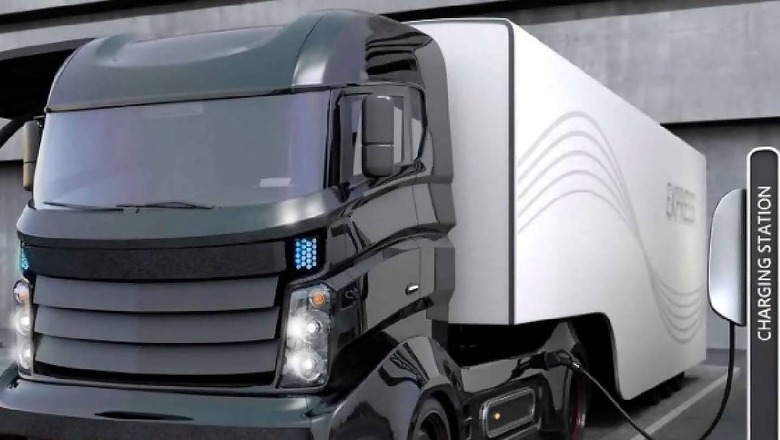
views
The global automotive industry is undergoing a seismic shift towards electric vehicles (EVs) driven by the urgent need to reduce carbon emissions and the rapid advancements in technology.
While electric cars and bikes have garnered significant attention, the electrification of heavy-duty trucks represents the next crucial frontier, especially for a country like India.
The transport sector is the fastest-growing source of carbon emissions with road transport accounting for 90 percent of the sector’s final energy consumption. Clean transport, specifically freight, is essential, given the rapid urbanisation, growth of e-commerce activity in India and the corresponding rise in emissions.
India’s 2.8 million trucks comprise only 2 percent of on-road vehicles and yet are responsible for about 40 percent of the emissions and fuel consumption from road transport. This makes us question whether the net zero goals will make zero-emission trucks the next frontier for India’s automotive industry.
We recently interacted with Tanmay Mishra, Consultant at Purpose, where he shared his point of view on how electric trucks could transform the automotive industry?
Driving Towards Net Zero
Electric Trucks can significantly reduce the carbon footprint, improve air quality, and contribute to India’s climate goals. Electric trucks convert a higher percentage of energy from batteries to propulsion compared to diesel engines, resulting in less energy consumption for the same distance travelled.
A determined transition to zero-emission trucks can lead to 2.8- 3.8 gigatonnes of cumulative CO2 savings through 2050, which is equal to or greater than India’s entire economy-wide annual GHG emissions today
Furthermore, with the fluctuating prices of fossil fuels and increasing awareness of environmental issues, there is a growing consensus on the need for sustainable and economically viable alternatives. Adopting electric trucks can significantly reduce India’s energy needs by enhancing energy efficiency and lowering reliance on imported oil.
Currently, road freight accounts for more than 25 percent of oil import expenditures and is expected to grow over 4x by 2050. ZET adoption can eliminate a cumulative total of 838 billion litres of diesel consumption by 2050, which would reduce oil expenditures by Rs 116 lakh crore through 2050.
However, the development of green energy sources to power these charging stations is crucial. Without this, the environmental benefits of electric trucks could be undermined by a continued reliance on fossil fuels for electricity generation.
According to the International Energy Agency & National Renewable Energy Laboratory electric trucks can be charged using renewable energy sources such as solar and wind, to further reduce overall energy consumption.
While the reduction in carbon emissions and lower dependency on oil imports are the most important factors in pushing the government to support this transition, electric trucks are garnering support from many others.
According to Nayi Soch Ki Sawaari, an initiative raising awareness about electric trucks, over 80 percent of the drivers showed enthusiasm for trying out electric trucks. A prime reason cited by many was the potentially better driving experience with clutch-free drive with modern air-conditioned cabins.
Being able to contribute to a clean and healthy environment for their children’s future was another. Some even pointed out that the charging time for trucks would ensure the necessary downtime for them during long hauls.
With these improvements, the transition to electric trucks also presents a unique opportunity to address gender disparities within the automotive and logistics industries. Traditionally male-dominated, these sectors can benefit from policies and initiatives that encourage greater gender diversity and inclusion.
This might even help improve the driver-to-truck ratio which currently stands at 750 drivers for every 1000 trucks. Empowering women through targeted training programs and inclusive policies can ensure that the benefits of the electric truck revolution are widely shared.
Despite the enthusiasm shown by the drivers, convincing fleet owners will need far more than a better driving experience and environmental benefits. Unless range anxiety, myths about safety and performance, high upfront costs, inadequacy of charging infrastructure and other apprehensions of the consumers are addressed, the transition remains an uphill battle.
However, these challenges also present opportunities for innovation and collaboration. For instance, advancements in battery recycling and second-life applications can create new industries and job opportunities. Similarly, the development of localised charging solutions can spur technological innovation and entrepreneurship.
The success of electric trucks hinges on a comprehensive and reliable ecosystem. The transition to electrification will require a concerted effort from all stakeholders, including manufacturers, fleet operators, government agencies, and industries.
Manufacturers must focus on producing vehicles that meet the specific needs of the Indian market, such as dealing with diverse road conditions and heavy loads. Government bodies should facilitate this transition through supportive policies, incentives, and infrastructure development.
Fleet owners and operators need to be educated about the long-term economic benefits and operational efficiencies of electric trucks. Drivers should be trained to handle the new technology, ensuring safety and optimal performance.



















Comments
0 comment